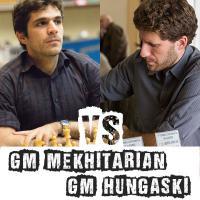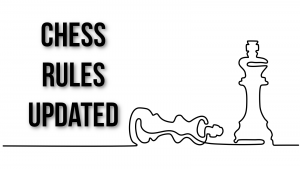
Mekhitarian Wins Death Match 16
GM Krikor Sevag Mekhitarian started well with four straight wins early on and eventually defeated GM Robert Hungaski by a three-game margin on Saturday in Chess.com's Deatch Match 16. The final score was 13-10 although the contest, which happened to be the shortest Death Match in history in terms of number of games, was closer than the score reflected.
The match had a fairly quiet start, with the first game at the 5+1 time control ending in a draw and both players showing solid chess. At the end Hungaski had too little time to convert a winning knight versus bishop ending. Unfortunately for him, this scenario would set the tone for the whole match, despite the fact that he would actually take the lead in the very next game.
Hungaski answered Mekhitarian's 1.e4 with the Philidor Defence, an opening that would serve him well in more games to follow. Both players brought out their pieces on healthy squares, and in a queenless middlegame Hungaski got the more flexible pawn structure. Eventually his single d-pawn was decisive combined with opening the h-file. It would be the last time Hungaski could enjoy the sweet feeling of a lead in the match.
The success was short-lived, as Mekhitarian then won four games in a row! With this winning streak the Brazilian Champion laid the foundation for his match victory as his opponent would never manage to decrease the gap to less than two points.

The fifth game of the match was exemplary for the high quality of the games played at this time control. There were a number of very instructive endgames! In this typical ending it probably took a while for Hungaski to realize that Black's plan of running with the a-pawn actually meant that he was clearly better.
Mekhitarian was leading with 4.5-1.5 when the match switched to the 3+1 time control. Somehow Hungaski seemed more comfortable with this faster rate of play, as he started with a devastating win! In a Classical Scheveningen, White got a queen to h5 early on, won an exchange and then Hungaski finished it off without making any mistakes to get to 4.5-2.5.
The next two games saw some critical moments that would influence the whole match. First, in another Philidor, Hungaski again had no problems whatsoever out of the opening and even seemed to be taking over the initiative. But then he started a combination with ...Bxb3 which turned out to be incorrect. He only gor two pawns for a piece, but the compensation was not enough and Mekhitarian had no trouble converting.
And then, in another Classical Scheveningen, Hungaski chose a different setup and again won an exchange, but this time Mekhitarian got good compensation. Black was doing alright, but there was one moment when, with little time on the clock, Hungaski missed a double attack (42.Qd5!) that would have won instantly. Instead he lost and the score came to 6.5-2.5 for Mekhitarian.
In game 10 Hungaski decided to try something else: the Ruy Lopez with 3..f5, the Jänisch/Schliemann variation. Mekhitarian seemed to know the theory well and ended up with a slight edge. Eventally he sac'ed a pawn to reach a middlegame with opposite-coloured bishops, which usually favors the attacker. Not here though; Hungaski defended his king, and even won the opposite-coloured bishop ending! It was "very similar to Krush-Zatonskih three years ago" according to GM Ben Finefold, who joined the commentary half-way after suffering from internet problems at the start.

After a draw in the next game, Mekhitarian won again as Hungaski probed a drawn ending too far. The score was 8.0-4.0 for the Brazilian when the players moved to the third time control: bullet, so 1+1.
Yet again, Hungaski seemed to profit the most from the small break and the change of pace. He defeated his opponent in games 13 and 14, the first time that he won two games in a row. However, "winning two games in a row is only as good as your next game when you're down two games," as commentator IM Danny Rensch quipped.
In game 15 Mekhitarian spoilt a completely winning rook ending and had to settle for a draw. Were these the first signs of fatigue on the Brazilian side? Would Hungaski get back into the match? At that point GM Ben Finegold had a hard time remaining unbiased and not rooting for the underdog, who happens to be a member of the same club!
However, Hungaski might have been "putting up a good fight" (Finegold); he also used too much time on the clock in many games. For example, here's game 16, where he was doing very well with the Black pieces in another opening he tried a few times: the Scandinavian. His clock handling was the only reason he went down here.
Hungaski did win the next game with excellent play in another Scheveningen ("plenty of time and plenty of passed pawns!" - Finegold) to bring back the score to 9.5-7.5.
The next game was another crucial one, with Mekhitarian switching to 1.d4 and Hungaski playing the Benoni ("a good opening for bullet play" - Finegold). Hungaski reached a better ending and then missed a winning fork (37...Rxe4! and 38...Nd3+), and gone was the chance to get to one game down. Instead, he got a knight trapped for the second time in the match and even lost.
Mekhitarian then won a good game with the Pirc defence, and won the next as well as Hungaski again needed too much time in a positionally winning position and lost on time. By then the score was 12.5-7.5 and the match was basically decided, as there was time for just three more games.
In game 21 Hungaski again got some chances but it ended in a draw. He did win the last two games to set the final score to an acceptable 13-10.
Afterwards Hungaski said: "I thought I would do well in the 5+1 and had to be careful in the bullet, but it was the other way around!" He admitted that Mekhitarian's early winning streak was key in this match: "Those four games definitely came back to haunt me."
Mekhitarian, on the other hand, didn't really keep track of the score and felt "clueless". "I was just playing the games. But it was a big difference for sure to have a good start."
About his time management, Hungaski said: "The tricky thing about one second increment is: you think you have increment but you can't really count on it that much."
"The bullet was completely crazy, with blunders, refusing draws, playing on for a hundred moves... But it was a lot of fun!" concluded the winner.
Don't forget the next Death Match 17 - Friday, September 6th, 2013: GM Arkadij Naiditsch vs Loek Van Wely - 10am Pacific Time and Death Match 18 - Saturday October 5th, 2013: GM Nigel Short vs GM Judit Polgar - 9am Pacific Time.

